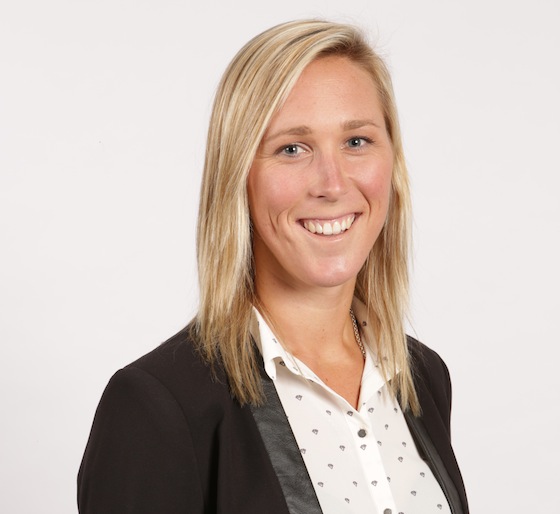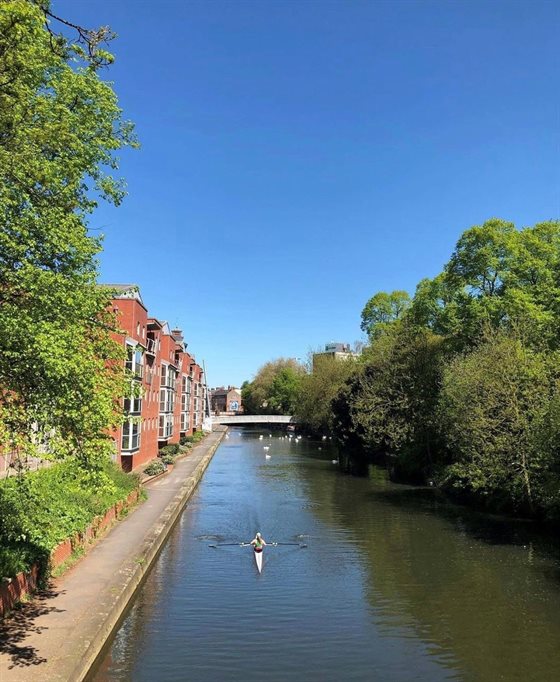Next month, in Tokyo, rower – and DMU graduate - Emma Twigg will take on her fourth Olympic Games. Few athletes make even one Olympic appearance in their careers; to compete at four puts her among the elite. But only a few years ago she was retired and in an office job. She speaks to DMU about the journey back to the boat – and to Tokyo.

In the chilly dawn, hours before students arrive on campus, De Montfort University is almost silent, save for the breath of distant traffic on the inner ring road.
Only one thing disturbs the scene: the creak of oars, coming from the River Soar.
As the lights come slowly on in classrooms and staff rooms across campus, one long, slim rowing boat slices through the surface of the river.
And as dog walkers and joggers pass by on the riverside path, they have no idea that the young woman powering her way past will, in a few months’ time, be many thousands of miles away, competing against the best rowers on earth, in front of a global audience of millions.
Because in 2016, while working hard to complete her studies at DMU, Emma Twigg was also in full training mode for the Olympics – and the River Soar was her go-to waterway to put in the miles.
“I spent hour, after hour on the River Soar training before and after classes,” she said. “It was challenging rowing up and down a river, it’s definitely not like a big lake.”
So how did she end up there, on the river most of us walk past every day? And what’s happened since then, to put her only weeks away from an amazing fourth Games?
After a fourth-place result in the 2012 London Olympics for the second time, Emma decided she wanted to add more strings to her bow and study for a masters.
Learning of the International MA in Management, Law and Humanities of Sport (FIFA Master) Emma had no hesitation that DMU was the right place for her.
Just two weeks after being named World Champion with a gold medal in the women’s single scull at the 2014 World Rowing Championships in Amsterdam, Emma was sat in a DMU classroom studying.
Emma said: “This time of my life, was almost as surreal as being at the Olympics. I applied for the course the year before the Rio 2016 games.
“I was at university and training at the same time.”
Even though she nearly missed out on a spot at the Rio Olympics due to conflictions, she said “I wouldn’t swap my time and experiences on the FIFA Masters course for anything.”

Photo of the River Soar captured by @yourleicester via Instagram
Thankfully, she ended up qualifying last minute in the final qualification regatta.
She added: “I loved the course at DMU’s International Centre for Sports History and Culture. It’s an amazing experience. The thing that makes it so unique is the diversity of the people. There were 28 different nationalities on the course.
“The whole experience really opened my eyes to different cultures and experiences. We all keep in touch now even and many of them will be friends for life. It’s a pretty unique experience.”
Post DMU and after another fourth place at Rio, Emma hung up her oar for nearly two years, and went to work in an office, at the International Olympic Committee in Lausanne, Switzerland.
It was there she spectated at the Winter Olympics. She said: “In 2018 after not rowing for almost two years this is what reignited the flame for my return to rowing.
“After Rio, I thought I was done, retired, but taking a step away and getting some perspective, changed my thoughts and off I went to join the rowing team once again in New Zealand.”
Even living on the other side of the world, Emma’s time at DMU has left lasting impact on her.
She has recently been seen virtually at DMU as a special guest speaker during the Women in Sport sub-module for the current 21st edition FIFA Master class.
“Its great to see DMU are setting time aside for a women’s specific seminar, to me this really shows that it is a topic of significance now.
“I think the more we can bring a lens to women in sport the better, there is definitely sports leading the way in terms of equality between men and women and I think there is still a huge amount of work that needs to be done.
“The more it is talked about, the more positive role models we have in sport, and the more people talking about it the more likely we are going to create profiles of female athletes and they become role models for young women.”
As the 34-year-old is set to take on her fourth Olympics in a matter of weeks, she reflected on her first Olympics which she took on at just 21-years- old, representing her country New Zealand, competing in the single scull at the 2008 Beijing Olympics.
Speaking of the experience, she said: “It was so surreal, I was still so young, but It was something I had dreamt of my whole life.
“At the time, due to my own nativity of the significance of it all, it didn’t sink in, I just accepted I was good enough to be there, I felt I had earnt it, but looking back it’s a massive achievement and it was very surreal.
“I do remember feeling this is pretty special, I am 21-years-old, and I am representing my country in the biggest sporting event in the world.”
Emma started rowing 20 years ago when she was just 14- years-old, starting with her school rowing club in Napier, New Zealand, which quickly progressed, to a World Champion title and three, soon to be Four Olympic games under her belt.
Now with more experience and a masters behind her she is ready to get back in the boat and show the world what she is made of. Next stop Tokyo.
Students on the FIFA Master programme study the first Humanities of Sport module of the course at DMU’s International Centre for Sports History and Culture, before moving to SDA Bocconi School of Management in Milan and then later the University of Neuchâtel in Switzerland for the final sports law module. Overall co-ordination is provided by the Centre International d’Etude du Sport (CIES) in Switzerland.
Posted on Tuesday 6 July 2021